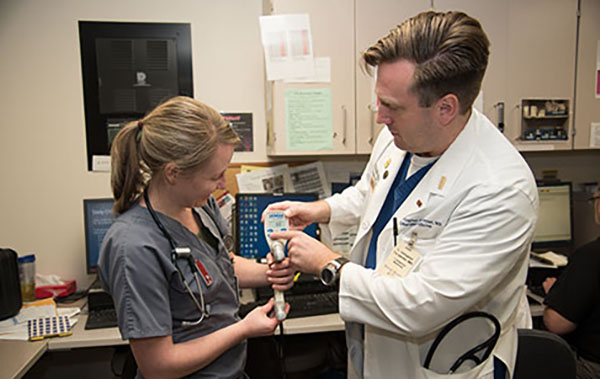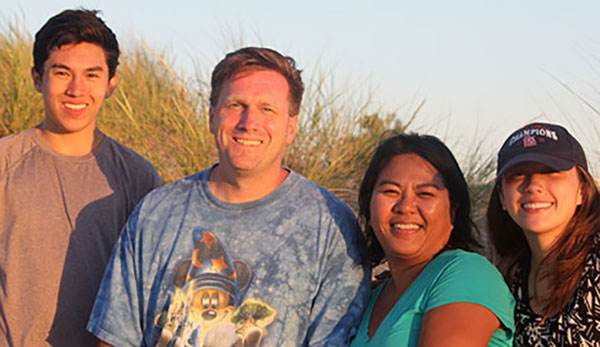
Although Chris Carpenter’s grandfather had Alzheimer’s disease, hospital staff asked the elderly man, and no one else, for his medical history during visits to the emergency room and then sent him home without specifying follow-up care. He died of a urinary infection on his 88th birthday.
Less than four months later, Carpenter’s 85-year-old grandmother died, also on her birthday, in an emergency room. The ER physician caring for her decided, against her family’s wishes, not to refer her to a surgeon for aortic repair. She died within an hour.
Watching his grandparents struggle at the end of their long lives has motivated Carpenter, MD, an associate professor of emergency medicine at Washington University School of Medicine, to work countless hours to improve emergency room care for older adults and to help create a new medical subspecialty — geriatric emergency medicine.
“When older people need emergency care, I want families to have a different experience than my family did,” Carpenter said.
Carpenter advocates for a long list of guidelines in emergency departments to better care for older adults. Some of those include designating or building specific areas to treat older adults, hiring doctors and nurses with geriatric expertise, stocking extra hearing aids and magnifying glasses, limiting the number of medications prescribed and screening for dementia. Other adaptations include installing guard and hand rails, additional lighting, nonskid flooring and rooms outfitted like inpatient suites with beds instead of stretchers.
He was part of a national task force to develop new geriatric emergency care guidelines that recently received approval from the main geriatrics organization and three major emergency medicine organizations.
He and a handful of other physicians who specialize in geriatric emergency medicine also created a boot camp that helps health-care systems implement the new guidelines. They will demonstrate this boot camp training in Toronto and Brisbane, Australia, during the next year, and hope to secure funding to provide training at more hospitals in the United States within the next two years.
‘The increasing number of older adults will challenge health-care systems around the world for many years,” Carpenter said. “Emergency departments play an important role in caring for older adults who are acutely injured or ill. And as the ‘front porch’ of the hospital, they also serve as the safety net for those who do not have primary care physicians. My peers and I thought it was very important to come up with alternate ways that incorporate geriatric concepts in caring for these patients.”
Trailblazing in geriatric medicine
Carpenter’s peers refer to him as a trailblazer, role model and, yes, even Superman.
“I can’t say greater things about Chris,” said Ula Hwang, MD, an associate professor of emergency medicine and of geriatrics at the Icahn School of Medicine at Mount Sinai in New York City. “He is a national leader and the epitome of dedication and tireless work for promoting geriatric care in the emergency department. He’s also dedicated to his family. I don’t know how he fits everything in.”
Donald Melady, MD, an emergency physician at Mount Sinai Hospital in Toronto, said Carpenter has been focusing on older people for years and has been a leader in this area. “He has helped put geriatric medicine on the global map and also enhanced geriatric emergency medicine in the United States,” he said. “He is one of the hardest working people around, both as an educator and as a researcher.”
In addition to his efforts in geriatric emergency medicine, Carpenter is an expert in evidence-based practice in emergency medicine. Evidence-based medicine is an approach to clinical practice that integrates research results with physician expertise and patient preferences. One colleague said that Carpenter’s expertise in both fields is like being a neurosurgeon and a rocket scientist because the fields are so different.
Brent Ruoff, MD, associate professor and director of the Division of Emergency Medicine at Washington University, said that Carpenter led the division into the era of evidence-based practice. “He initiated our evidence-based journal club, which analyzes published peer-reviewed clinical trials and has taught us all to become better physicians,” Ruoff said. “He also sets the standard for productivity in our division. He’s almost always first in the office and frequently leaves late.”
Deciding to become a physician
Carpenter grew up in Grand Rapids, Mich., and planned to become a veterinarian. He loved animals and enjoyed reading James Herriot’s book, “All Creatures Great and Small.”
But his mom always encouraged him to become a physician. Carpenter majored in chemistry at Hope College, a small liberal arts school in Holland, Mich. During his junior year, his stepfather, an internal medicine physician, invited Carpenter to do rounds with him and sit in on some of his office visits.
“I changed my mind,” Carpenter said. “I saw how rewarding caring for people could be.”
During medical school at Wayne State University, he worked at Detroit Receiving Hospital on Friday nights. There, he learned from some of the physicians who helped develop the specialty of emergency medicine in the United States, including Ron Krome, MD, Judith Tintinalli, MD, and Brocks Bock, MD.
“I was inspired by these physicians, and the work was very rewarding,” he said. “People would come in almost dead, and you’d be able to save their lives in five minutes. If they had stab wounds, you could quickly decompress their chests and save their lives.”
After an internship with the U.S. Navy in which he trained with the Navy SEALS, he completed a combined five-year internal medicine/emergency medicine residency at Allegheny General Hospital in Pittsburgh.
During his residency, Carpenter became interested in geriatrics. It was hard for him to understand why there weren’t any emergency medicine textbooks on geriatric patients because the majority of patients he saw in the emergency department were older adults. He also realized that older adults stay in emergency departments longer and use more resources.
He joined the emergency medicine division at Washington University as an instructor in 2003. One of the reasons he chose the university was because of its strong emphasis on clinical research. With a focus on epidemiology, Carpenter completed a master’s degree in clinical investigation in 2007. He was named associate professor of emergency medicine in 2013.
Carpenter’s perseverance is evident in the many years he’s worked, despite roadblocks and frustrations, to improve care for older adults in the emergency department and to advance evidence-based practice in emergency medicine.
Melady, at Mount Sinai Hospital in Toronto, has collaborated with Carpenter for about six years. He said Carpenter is motivated simply by making the lives of individuals better. “It’s quite inspiring for the people who work with Chris,” Melady said.
In the long-term, Carpenter said he hopes to see the specialty of geriatric emergency medicine grow and to ensure that the science in his field is up to par. He also is driven by the need to do the best he can for patients. “I work very hard so that when I walk into a patient’s room in the emergency department, I am the most competent that I can be and am able to handle anything that presents itself, particularly if it involves older patients,” Carpenter said. “I also need to be able to train residents to do the same.”
